环境污染垃圾污染英文版Garbage pollution
- 格式:pptx
- 大小:3.64 MB
- 文档页数:7
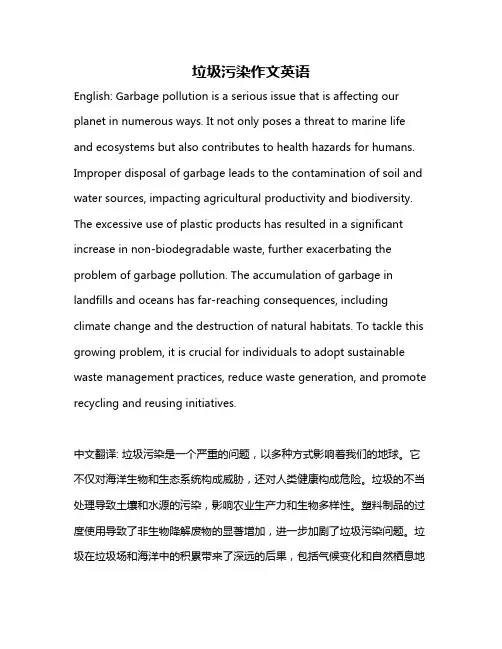
垃圾污染作文英语English: Garbage pollution is a serious issue that is affecting our planet in numerous ways. It not only poses a threat to marine life and ecosystems but also contributes to health hazards for humans. Improper disposal of garbage leads to the contamination of soil and water sources, impacting agricultural productivity and biodiversity. The excessive use of plastic products has resulted in a significant increase in non-biodegradable waste, further exacerbating the problem of garbage pollution. The accumulation of garbage in landfills and oceans has far-reaching consequences, including climate change and the destruction of natural habitats. To tackle this growing problem, it is crucial for individuals to adopt sustainable waste management practices, reduce waste generation, and promote recycling and reusing initiatives.中文翻译: 垃圾污染是一个严重的问题,以多种方式影响着我们的地球。
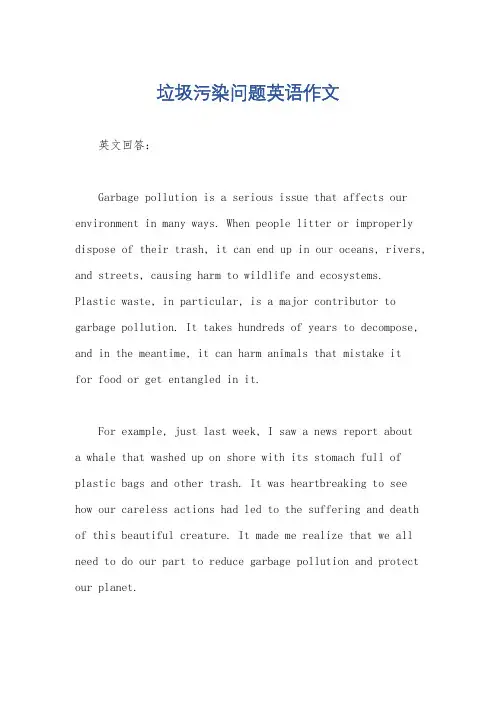
垃圾污染问题英语作文英文回答:Garbage pollution is a serious issue that affects our environment in many ways. When people litter or improperly dispose of their trash, it can end up in our oceans, rivers, and streets, causing harm to wildlife and ecosystems.Plastic waste, in particular, is a major contributor to garbage pollution. It takes hundreds of years to decompose, and in the meantime, it can harm animals that mistake itfor food or get entangled in it.For example, just last week, I saw a news report abouta whale that washed up on shore with its stomach full of plastic bags and other trash. It was heartbreaking to see how our careless actions had led to the suffering and death of this beautiful creature. It made me realize that we all need to do our part to reduce garbage pollution and protect our planet.One way we can help is by reducing our use of single-use plastics, such as plastic bags, straws, and water bottles. Instead, we can use reusable alternatives likecloth bags, metal straws, and refillable water bottles. By making small changes in our daily habits, we can make a big difference in reducing garbage pollution.中文回答:垃圾污染是一个严重的问题,对我们的环境产生了许多影响。
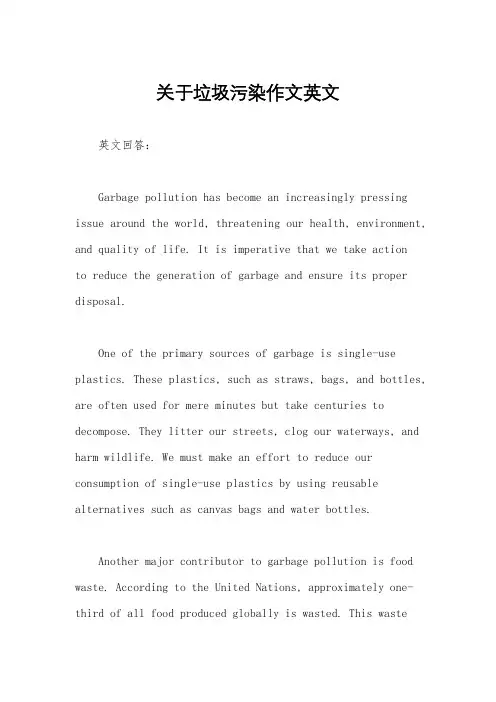
关于垃圾污染作文英文英文回答:Garbage pollution has become an increasingly pressing issue around the world, threatening our health, environment, and quality of life. It is imperative that we take actionto reduce the generation of garbage and ensure its proper disposal.One of the primary sources of garbage is single-use plastics. These plastics, such as straws, bags, and bottles, are often used for mere minutes but take centuries to decompose. They litter our streets, clog our waterways, and harm wildlife. We must make an effort to reduce our consumption of single-use plastics by using reusable alternatives such as canvas bags and water bottles.Another major contributor to garbage pollution is food waste. According to the United Nations, approximately one-third of all food produced globally is wasted. This wastenot only represents a loss of valuable resources but also contributes to greenhouse gas emissions. We can reduce food waste by planning our meals ahead of time, buying only what we need, and composting food scraps.In addition to reducing the generation of garbage, it is also essential to ensure its proper disposal. One effective method is recycling. By separating recyclable materials such as paper, plastic, and metal from garbage, we divert them from landfills and incineration facilities. Recycling helps to conserve natural resources, reduce energy consumption, and minimize waste.Composting is another sustainable way to dispose of organic waste such as food scraps and yard trimmings. Composting breaks down organic matter into a nutrient-rich material that can be used to fertilize plants. Composting reduces the amount of waste going to landfills and provides a natural fertilizer for our gardens.Landfills remain a necessary component of waste management, but it is crucial to minimize theirenvironmental impact. Modern landfills are designed with liners and other measures to prevent leachate from contaminating groundwater. Methane produced by decomposing garbage can also be captured and used to generate electricity.It is not enough to rely solely on government regulations and waste management companies to address the issue of garbage pollution. We all have a role to play in reducing waste and ensuring its proper disposal. By making small changes in our daily lives, such as bringing our own reusable bags to the grocery store and composting food scraps, we can make a significant difference.By working together, we can create a future where garbage pollution is a thing of the past. Our health, our environment, and our future generations depend on it.中文回答:垃圾污染已成为世界范围内日益严峻的问题,威胁着我们的健康、环境和生活质量。
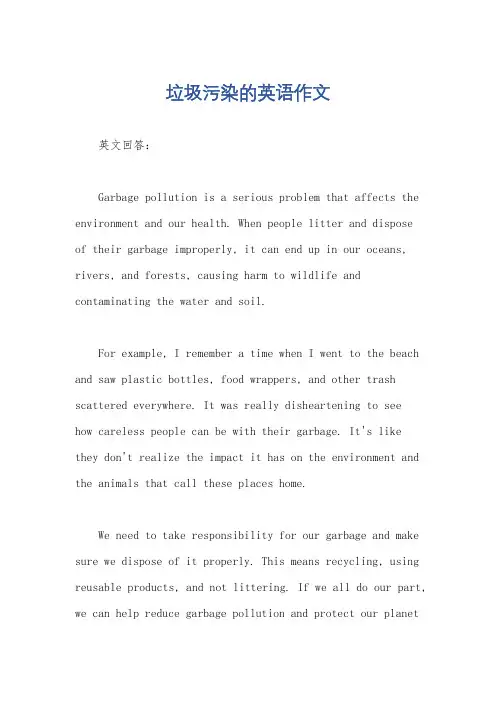
垃圾污染的英语作文英文回答:Garbage pollution is a serious problem that affects the environment and our health. When people litter and disposeof their garbage improperly, it can end up in our oceans, rivers, and forests, causing harm to wildlife and contaminating the water and soil.For example, I remember a time when I went to the beach and saw plastic bottles, food wrappers, and other trash scattered everywhere. It was really disheartening to seehow careless people can be with their garbage. It's like they don't realize the impact it has on the environment and the animals that call these places home.We need to take responsibility for our garbage and make sure we dispose of it properly. This means recycling, using reusable products, and not littering. If we all do our part, we can help reduce garbage pollution and protect our planetfor future generations.中文回答:垃圾污染是一个严重的问题,影响环境和我们的健康。
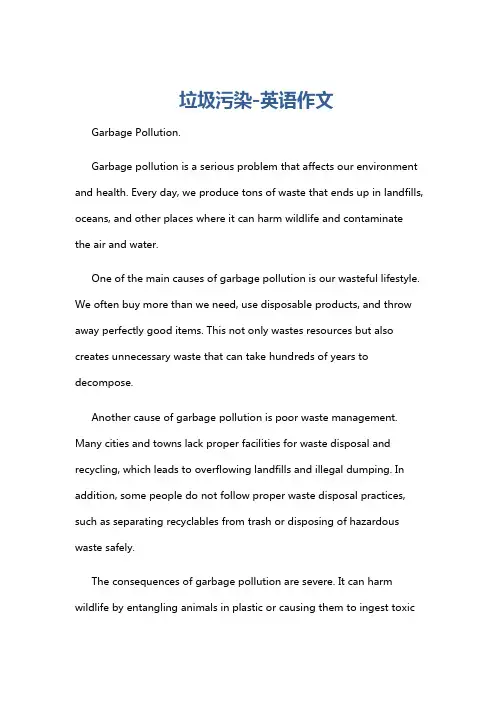
垃圾污染-英语作文Garbage Pollution.Garbage pollution is a serious problem that affects our environment and health. Every day, we produce tons of waste that ends up in landfills, oceans, and other places where it can harm wildlife and contaminate the air and water.One of the main causes of garbage pollution is our wasteful lifestyle. We often buy more than we need, use disposable products, and throw away perfectly good items. This not only wastes resources but also creates unnecessary waste that can take hundreds of years to decompose.Another cause of garbage pollution is poor waste management. Many cities and towns lack proper facilities for waste disposal and recycling, which leads to overflowing landfills and illegal dumping. In addition, some people do not follow proper waste disposal practices, such as separating recyclables from trash or disposing of hazardous waste safely.The consequences of garbage pollution are severe. It can harm wildlife by entangling animals in plastic or causing them to ingest toxicmaterials. It can also contaminate the air and water, leading to health problems for humans and animals alike. In addition, garbage pollution can damage the beauty of our natural landscapes and reduce our quality of life.To address garbage pollution, we need to take action at all levels. Individuals can reduce their waste by using reusable products, composting, and recycling. Governments can invest in better waste management facilities and enforce laws to prevent illegal dumping. Businesses can reduce their waste by using sustainable practices and packaging.In conclusion, garbage pollution is a serious problem that requires our attention and action. By working together, we can reduce our waste and protect our environment for future generations.。
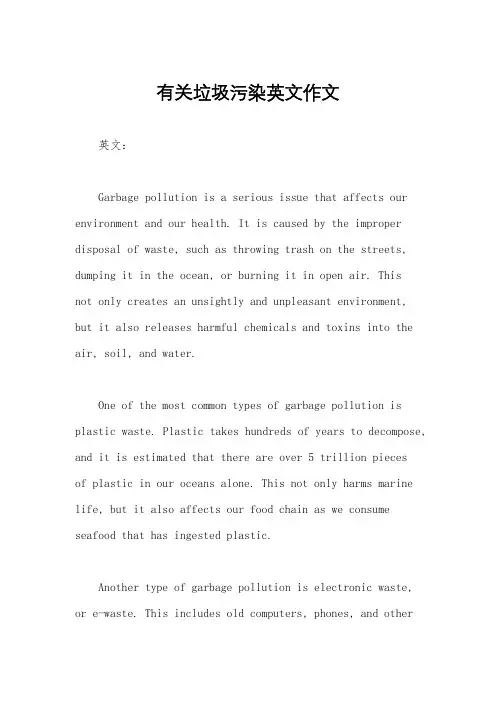
有关垃圾污染英文作文英文:Garbage pollution is a serious issue that affects our environment and our health. It is caused by the improper disposal of waste, such as throwing trash on the streets, dumping it in the ocean, or burning it in open air. Thisnot only creates an unsightly and unpleasant environment, but it also releases harmful chemicals and toxins into the air, soil, and water.One of the most common types of garbage pollution is plastic waste. Plastic takes hundreds of years to decompose, and it is estimated that there are over 5 trillion piecesof plastic in our oceans alone. This not only harms marine life, but it also affects our food chain as we consume seafood that has ingested plastic.Another type of garbage pollution is electronic waste,or e-waste. This includes old computers, phones, and otherelectronic devices that are often discarded improperly. E-waste contains toxic chemicals that can contaminate the environment and harm human health.To combat garbage pollution, we need to take action at both the individual and societal levels. This includes reducing our consumption of single-use plastics, properly disposing of waste, and implementing recycling programs. Governments and businesses also have a responsibility to invest in sustainable practices and technologies to reduce waste and pollution.中文:垃圾污染是一个严重的问题,它影响着我们的环境和健康。
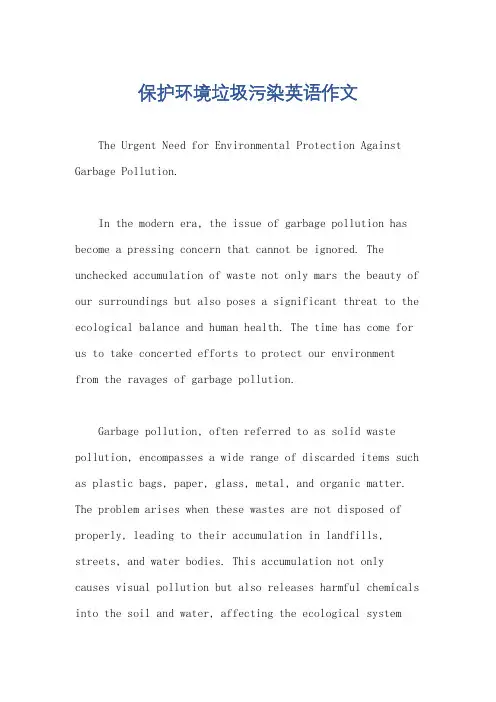
保护环境垃圾污染英语作文The Urgent Need for Environmental Protection Against Garbage Pollution.In the modern era, the issue of garbage pollution has become a pressing concern that cannot be ignored. The unchecked accumulation of waste not only mars the beauty of our surroundings but also poses a significant threat to the ecological balance and human health. The time has come for us to take concerted efforts to protect our environment from the ravages of garbage pollution.Garbage pollution, often referred to as solid waste pollution, encompasses a wide range of discarded items such as plastic bags, paper, glass, metal, and organic matter. The problem arises when these wastes are not disposed of properly, leading to their accumulation in landfills, streets, and water bodies. This accumulation not only causes visual pollution but also releases harmful chemicals into the soil and water, affecting the ecological systemand human life.One of the primary causes of garbage pollution is the lack of awareness among individuals and communities about the importance of proper waste disposal. Many people fail to segregate their waste into recyclable and non-recyclable categories, leading to the mixing of harmful chemicals and the contamination of recyclable materials. In addition, the inadequate infrastructure for waste management and the lack of enforcement of waste disposal regulations alsocontribute to the problem.The impact of garbage pollution is far-reaching and multifaceted. It contaminates water bodies, affecting aquatic life and drinking water quality. It also releases harmful gases into the atmosphere, contributing to air pollution and climate change. The accumulation of waste in landfills takes up valuable space, leading to soil degradation and the release of toxic substances into the groundwater. Furthermore, garbage pollution can also spread diseases and pests, posing a threat to human health.To address the issue of garbage pollution effectively,a multi-pronged approach is required. Firstly, there is a need to raise awareness among individuals and communities about the importance of proper waste disposal and recycling. Educational campaigns and community events can be organized to promote waste segregation and recycling practices. Secondly, governments should invest in improving waste management infrastructure, including the establishment of more landfills and recycling centers. They should also enforce strict regulations on waste disposal and penalize those who fail to comply.In addition, technological advancements can play a crucial role in reducing garbage pollution. Innovationssuch as waste-to-energy plants and advanced recycling techniques can help convert waste into useful resources, reducing its negative impact on the environment. Furthermore, the adoption of green policies by governments and businesses can encourage sustainable practices and reduce waste generation.In conclusion, the fight against garbage pollution is ashared responsibility that requires the concerted efforts of individuals, communities, governments, and businesses. By raising awareness, improving waste management infrastructure, and adopting sustainable practices, we can protect our environment and ensure a healthy and sustainable future for ourselves and our planet. The time is now for us to take action and make a difference.。
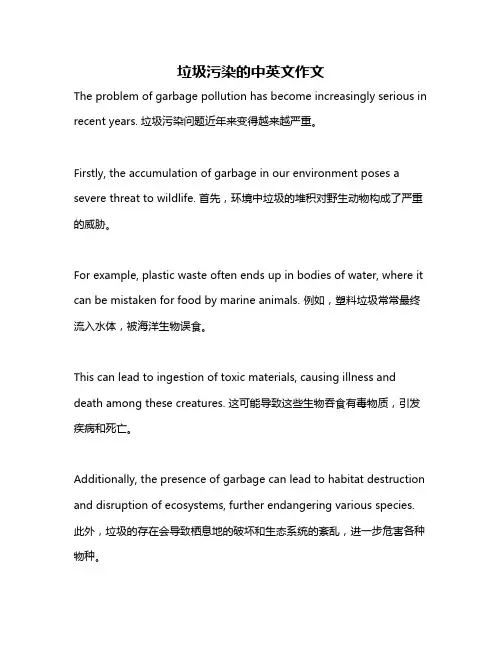
垃圾污染的中英文作文The problem of garbage pollution has become increasingly serious in recent years. 垃圾污染问题近年来变得越来越严重。
Firstly, the accumulation of garbage in our environment poses a severe threat to wildlife. 首先,环境中垃圾的堆积对野生动物构成了严重的威胁。
For example, plastic waste often ends up in bodies of water, where it can be mistaken for food by marine animals. 例如,塑料垃圾常常最终流入水体,被海洋生物误食。
This can lead to ingestion of toxic materials, causing illness and death among these creatures. 这可能导致这些生物吞食有毒物质,引发疾病和死亡。
Additionally, the presence of garbage can lead to habitat destruction and disruption of ecosystems, further endangering various species. 此外,垃圾的存在会导致栖息地的破坏和生态系统的紊乱,进一步危害各种物种。
Moreover, garbage pollution also has negative impacts on human health. 此外,垃圾污染还对人类健康产生负面影响。
Improper disposal of waste can contaminate soil and water sources, leading to the spread of diseases and other health hazards. 不当处理垃圾会污染土壤和水源,导致疾病和其他健康危害的蔓延。
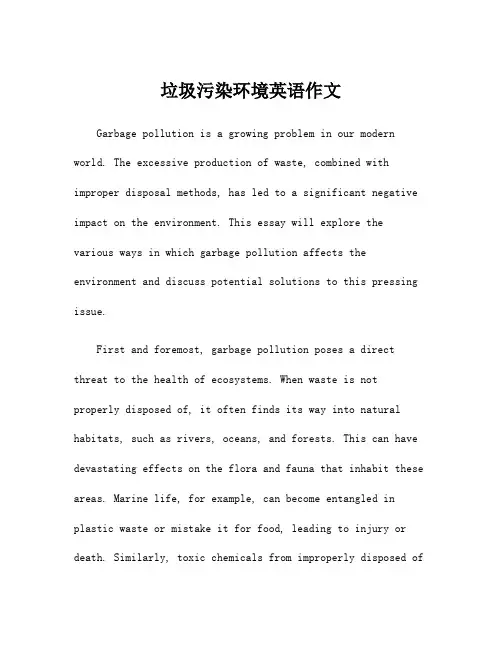
垃圾污染环境英语作文Garbage pollution is a growing problem in our modern world. The excessive production of waste, combined with improper disposal methods, has led to a significant negative impact on the environment. This essay will explore the various ways in which garbage pollution affects the environment and discuss potential solutions to this pressing issue.First and foremost, garbage pollution poses a direct threat to the health of ecosystems. When waste is not properly disposed of, it often finds its way into natural habitats, such as rivers, oceans, and forests. This can have devastating effects on the flora and fauna that inhabit these areas. Marine life, for example, can become entangled in plastic waste or mistake it for food, leading to injury or death. Similarly, toxic chemicals from improperly disposed ofwaste can leach into soil and water, contaminating the environment and causing harm to plants, animals, and humans alike.In addition to harming ecosystems, garbage pollution also has a detrimental effect on the climate. The decomposition of organic waste in landfills produces methane, a potent greenhouse gas that contributes to global warming. Furthermore, the production and disposal of waste require significant amounts of energy and resources, contributing to carbon emissions and the depletion of natural resources.Moreover, garbage pollution has social and economic impacts. Improper waste management can lead to unsightly and unsanitary conditions in communities, decreasing quality of life and deterring potential investment and tourism. The financial cost of managing and cleaning up waste also places a burden on local governments and taxpayers.To address the issue of garbage pollution, a multi-faceted approach is needed. Firstly, efforts should be made to reduce the amount of waste produced. This can be achieved through initiatives such as promoting recycling and composting, reducing packaging and single-use items, and encouraging sustainable consumption practices. In addition, improvements in waste management infrastructure, such as increased recycling facilities and waste-to-energy technologies, are crucial for handling the waste that is produced in an environmentally responsible manner.Education and awareness also play a vital role in addressing garbage pollution. By educating individuals about the impact of their consumption and waste disposal habits, as well as the importance of proper waste management, people can be empowered to make more sustainable choices and take action to reduce their environmental footprint.In conclusion, garbage pollution poses a significant threat to the environment, with far-reaching impacts on ecosystems, the climate, and society as a whole. Addressing this issue requires a concerted effort from individuals, communities, governments, and businesses to reduce waste production, improve waste management practices, and raise awareness about the importance of protecting the environment. By taking action to combat garbage pollution, we can preserve the health and vitality of our planet for future generations.。
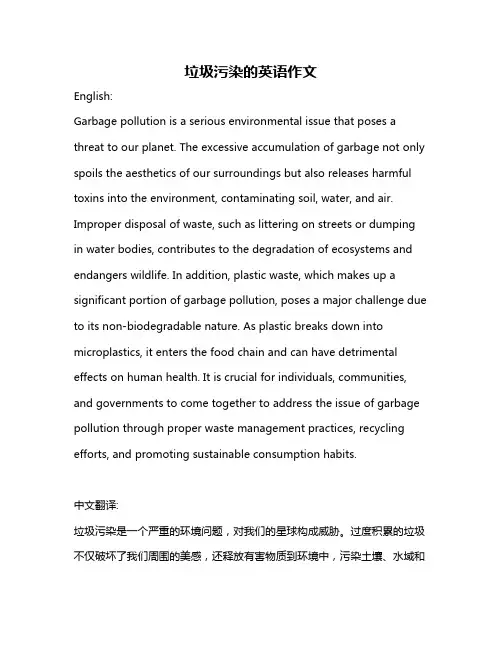
垃圾污染的英语作文English:Garbage pollution is a serious environmental issue that poses a threat to our planet. The excessive accumulation of garbage not only spoils the aesthetics of our surroundings but also releases harmful toxins into the environment, contaminating soil, water, and air. Improper disposal of waste, such as littering on streets or dumping in water bodies, contributes to the degradation of ecosystems and endangers wildlife. In addition, plastic waste, which makes up a significant portion of garbage pollution, poses a major challenge due to its non-biodegradable nature. As plastic breaks down into microplastics, it enters the food chain and can have detrimental effects on human health. It is crucial for individuals, communities, and governments to come together to address the issue of garbage pollution through proper waste management practices, recycling efforts, and promoting sustainable consumption habits.中文翻译:垃圾污染是一个严重的环境问题,对我们的星球构成威胁。
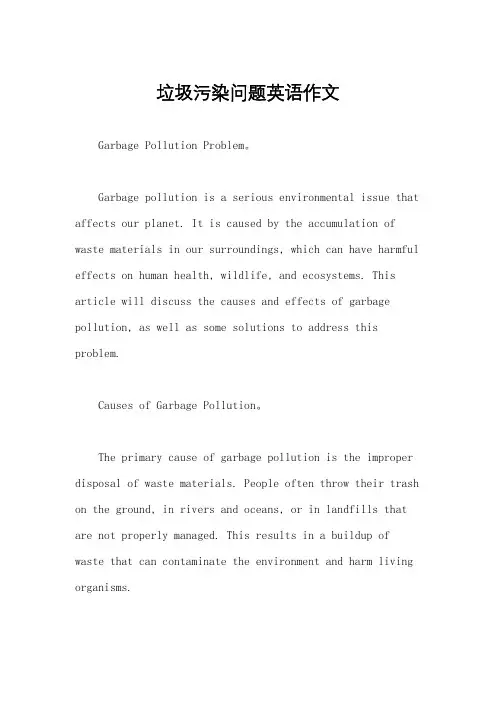
垃圾污染问题英语作文Garbage Pollution Problem。
Garbage pollution is a serious environmental issue that affects our planet. It is caused by the accumulation of waste materials in our surroundings, which can have harmful effects on human health, wildlife, and ecosystems. This article will discuss the causes and effects of garbage pollution, as well as some solutions to address this problem.Causes of Garbage Pollution。
The primary cause of garbage pollution is the improper disposal of waste materials. People often throw their trash on the ground, in rivers and oceans, or in landfills that are not properly managed. This results in a buildup of waste that can contaminate the environment and harm living organisms.Another cause of garbage pollution is the overconsumption of goods. As people continue to buy moreand more products, they generate more waste that needs tobe disposed of. This includes packaging materials, such as plastic bags and containers, which can take hundreds of years to decompose.Effects of Garbage Pollution。
垃圾污染英语作文Title: The Menace of Garbage Pollution。
Garbage pollution, a growing concern in modern society, poses significant threats to our environment, public health, and ecosystems. From overflowing landfills to plastic littering our oceans, the consequences of inadequate waste management are increasingly apparent. This essay will delve into the causes, effects, and potential solutions tomitigate the scourge of garbage pollution.Firstly, one of the primary causes of garbage pollution is excessive consumption and improper disposal of waste. In our consumer-driven culture, the demand for goods resultsin the generation of vast amounts of waste. Additionally, inadequate waste management infrastructure exacerbates the problem, leading to overflowing landfills andindiscriminate dumping.The effects of garbage pollution are far-reaching anddetrimental. One of the most visible consequences is the degradation of landscapes and water bodies. Piles of trash not only mar the natural beauty of our surroundings but also contaminate soil and water sources, posing risks to both wildlife and human health. Moreover, plastic waste poses a grave threat to marine life, with countless marine animals falling victim to ingestion or entanglement.Furthermore, garbage pollution contributes to environmental degradation and climate change. The decomposition of organic waste in landfills produces methane, a potent greenhouse gas that contributes to global warming. Additionally, the production and disposal of plastics consume significant amounts of energy and resources, further exacerbating environmental degradation.Addressing the menace of garbage pollution requires a multifaceted approach encompassing various strategies. Firstly, promoting waste reduction and recyclinginitiatives can help minimize the volume of waste entering landfills. Education and awareness campaigns are crucial in encouraging responsible consumption and waste managementpractices among individuals and communities.Investment in waste management infrastructure is also paramount. Governments and local authorities mustprioritize the development of efficient waste collection, sorting, and recycling facilities to manage waste effectively. Furthermore, strict regulations and enforcement mechanisms are necessary to deter illegal dumping and promote compliance with waste management regulations.Innovative solutions such as waste-to-energy technologies offer promising avenues for mitigating garbage pollution while simultaneously generating renewable energy. By converting waste into electricity or fuel, these technologies not only reduce the burden on landfills but also contribute to sustainable energy production.Moreover, fostering a culture of environmental stewardship is essential in combating garbage pollution. Encouraging individuals to adopt eco-friendly practices such as reducing single-use plastics, composting organicwaste, and participating in cleanup efforts can make a significant difference in mitigating pollution.In conclusion, garbage pollution represents a pressing environmental challenge with far-reaching implications for our planet. By addressing the root causes, implementing effective waste management strategies, and fostering individual and collective responsibility, we can work towards a cleaner, healthier environment for present and future generations.This essay delves into the causes, effects, and potential solutions to mitigate the scourge of garbage pollution.。
关于垃圾污染作文英文Garbage pollution is a serious problem in our society. It can be seen everywhere, from the streets to the oceans. The sight of trash piling up in landfills and floating in the water is a sad reminder of the impact of human activity on the environment.The consequences of garbage pollution are far-reaching. It not only spoils the beauty of our surroundings, but also poses a threat to wildlife. Animals often mistake trash for food, leading to ingestion of harmful materials and, ultimately, death. Moreover, the decomposition of garbage releases toxins into the soil and water, further damaging the ecosystem.One of the main causes of garbage pollution is the excessive use of single-use plastics. Items like plastic bags, bottles, and straws are used for a few minutes and then discarded, but they can take hundreds of years to decompose. This over-reliance on disposable products hasled to a massive accumulation of waste in our environment.Efforts to combat garbage pollution are underway, but more needs to be done. Recycling and proper waste disposal are essential steps in reducing the amount of trash that ends up in our environment. Additionally, public awareness and education on the importance of reducing, reusing, and recycling are crucial in changing people's attitudes and behaviors towards waste.Individual actions can also make a difference in the fight against garbage pollution. Simple habits such as using reusable bags and water bottles, avoiding single-use plastics, and participating in community clean-up efforts can have a positive impact on the environment.In conclusion, garbage pollution is a pressing issue that requires immediate attention and action. By working together to reduce our waste and properly manage our trash, we can help protect the planet for future generations.。
英语作文垃圾污染Title: The Impact of Garbage Pollution on the Environment。
Garbage pollution, also known as littering or waste contamination, poses a significant threat to the environment and human health. This issue has gained increasing attention in recent years due to its adverse effects on ecosystems, wildlife, and public spaces. In this essay, we will explore the causes and consequences of garbage pollution and discuss potential solutions to mitigate its harmful impacts.Firstly, one of the primary causes of garbage pollution is improper waste disposal practices. Many individuals and industries irresponsibly dispose of their waste, either by littering in public areas or dumping it into water bodies and landfills. This careless behavior contributes to the accumulation of garbage in the environment, leading to pollution of air, soil, and water resources.Moreover, the excessive production of single-useplastic items has exacerbated the problem of garbage pollution. Plastic products, such as bottles, bags, and packaging materials, take hundreds of years to decompose, persisting in the environment long after they are discarded. As a result, plastic pollution has become a pervasive issue, contaminating oceans, rivers, and terrestrial habitats worldwide.The consequences of garbage pollution are far-reaching and multifaceted. One of the most immediate impacts is aesthetic degradation, as littered areas detract from the beauty of natural landscapes and urban environments. Furthermore, garbage pollution poses serious threats to wildlife, as animals may ingest or become entangled in plastic debris, leading to injury, suffocation, or starvation. Marine creatures, in particular, are vulnerable to plastic ingestion, with devastating effects on marine ecosystems and biodiversity.In addition to harming wildlife, garbage pollution alsoposes risks to human health. Contaminated water sources can spread diseases and toxins, jeopardizing public health in communities around the world. Moreover, the presence of litter in public spaces can create breeding grounds for pests and vectors, increasing the prevalence of vector-borne diseases.Addressing the issue of garbage pollution requires a multi-faceted approach involving individuals, communities, governments, and industries. One crucial step is to promote public awareness and education about the importance of proper waste management and the environmental consequences of littering. By encouraging responsible consumption and waste reduction practices, we can minimize the generation of garbage and mitigate its negative impacts on the environment.Furthermore, governments play a pivotal role in implementing policies and regulations to regulate waste disposal and promote recycling and waste diversion initiatives. By enforcing littering laws and imposing penalties for illegal dumping, authorities can deterirresponsible behavior and encourage compliance with waste management regulations.Moreover, the development and adoption of sustainable alternatives to single-use plastics are essential for reducing plastic pollution and mitigating its environmental footprint. Innovations in packaging design, material science, and recycling technologies can help transition towards a circular economy model where resources are reused, recycled, or repurposed to minimize waste generation.In conclusion, garbage pollution poses a significant threat to the environment and human well-being, with far-reaching consequences for ecosystems, wildlife, and public health. Addressing this issue requires collective actionand collaboration at the individual, community, and global levels. By promoting responsible waste management practices, supporting recycling initiatives, and advocating for policy changes, we can work towards a cleaner, healthier planetfor future generations.。
垃圾污染危害英语作文40词英文回答:Pollution is a problem that affects all of us. It comes in many forms, but one of the most common is garbage pollution. Garbage pollution is the disposal of waste materials in an improper way. This can include littering, dumping, and illegal disposal.Garbage pollution has a number of negative impacts on our environment. It can contaminate our water, soil, and air. It can also harm wildlife and damage ecosystems. In addition, garbage pollution can be unsightly and can lower property values.There are a number of things that can be done to reduce garbage pollution. One important step is to reduce the amount of waste that we produce. This can be done by recycling, composting, and buying less packaging. We can also properly dispose of our waste by placing it in garbagecans or recycling bins.By taking these steps, we can help to reduce garbage pollution and protect our environment.中文回答:垃圾污染是困扰我们所有人的一个问题。
垃圾污染作文英语The Perils of Garbage PollutionGarbage pollution is a serious issue that affects our environment and health in profound ways. As human beings, we generate an enormous amount of waste on a daily basis, from household garbage to industrial by-products. The improper management and disposal of this waste can lead to severe consequences for both our planet and ourselves.One of the most significant impacts of garbage pollution is the damage it causes to our natural environment. When waste is not disposed of properly, it can contaminate soil and water bodies, leading to the degradation of ecosystems and the loss of biodiversity. For example, plastic waste, which is not biodegradable, can accumulate in landfills and eventually leak into the soil and groundwater, contaminating drinking water supplies and harming marine life.In addition to environmental degradation, garbage pollution also poses a threat to human health. The presence of harmful chemicals and bacteria in untreated waste can pose a risk of infection and disease transmission, particularly in areas where waste is dumped or burned without proper treatment. Furthermore, the inhalation of harmful gases and particles emitted from open burning of waste can lead to respiratory problems and other health issues.To address the issue of garbage pollution, it is crucial that we adopt sustainable waste management practices. This includes reducing, reusing, and recycling waste, as well as ensuring that waste is disposed of properly and safely. Governments and individuals alike must take responsibility for reducing waste generation and promoting waste reduction measures such as composting, reuse, and recycling.In conclusion, garbage pollution is a serious problem that requires urgent attention. By adopting sustainable waste management practices and taking responsibility for our waste generation, we can help protect our environment and health from the harmful effects of garbage pollution.。